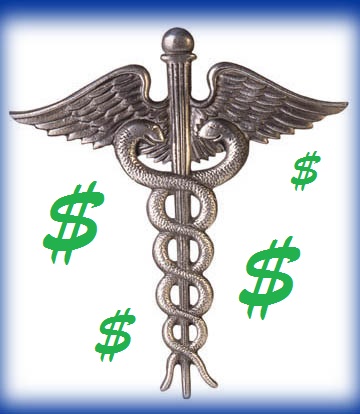I have 5 Ways to Avoid Healthcare Bankruptcy through strategic planning. The statistics are worse than I thought, and people are living their lives without knowing or understanding the “time bomb” that is ticking in their lives. We never know when something will happen to us. Often, we think nothing will ever happen to us, but that is a costly mistake.
Major Medical is Often Not Enough to cover these 5 Ways to Avoid Healthcare Bankruptcy

Even with Major Medical insurance, people are going bankrupt. It’s an epidemic that not only hurts the individual that is going through bankruptcy, but it also hurts the doctors, hospitals, radiology facilities, laboratory diagnostic companies, therapists and others. The bankruptcies hurt the healthcare system by forcing them to “write-off” debt. Then the healthcare system has no other recourse, but to raise prices to compensate themselves for their losses. It’s a horrifying cycle that is unsustainable.
Even with Major Medical insurance, people are going bankrupt. It’s an epidemic that not only hurts the individual that is going through bankruptcy, but it also hurts the doctors, hospitals, radiology facilities, laboratory diagnostic companies, therapists, and others. The bankruptcies hurt the healthcare system by forcing them to “write off” debt. Then the healthcare system has no other recourse but to raise prices to compensate themselves for their losses. It’s a horrifying cycle that is unsustainable.
In the following paragraphs, I’m going to share with you the statistics of healthcare cost bankruptcies.
According to Krulick, a 2005 study showed that 46% of all bankruptcies in 2005 were caused by healthcare costs.[1]
MH Sub I, LLC said that a study from 2013 demonstrated that healthcare accounted for 42% of the bankruptcies in America, and 78% of the people seeking bankruptcy had medical insurance. Healthcare bankruptcies were followed by job loss bankruptcies at 22%, uncontrolled spending at 15%, divorce at 8%, and unexpected disasters at 7%. Various other reasons make up the remaining 6%.[2]
According to Huff Post, a small Harvard University study showed that medical expenses were the reason for approximately 62% of personal bankruptcies in America. The study also showed that 72% of those who filed for bankruptcy had some type of health insurance, so it is not only the uninsured that face financial catastrophes. It can happen to anyone.
Huff Post goes on to say that nearly 97% of bankruptcies are made by individuals, not by businesses.[3] These statistics fluctuate between authors and studies, but the statistics remain consistent. Healthcare causes more bankruptcies than any other cause, by far. The 62% statistic is probably exaggerated, but 42-46% of bankruptcies with healthcare costs being a primary cause is probably accurate. According to NerdWallet, an estimated 1.7 million people filed for bankruptcy protection in 2013 due to healthcare expenses. Even those that don’t file bankruptcy, about 56 million adults, will still struggle with healthcare-related costs.[4]
Here are 5 Ways to Avoid Healthcare Bankruptcy.
Maintain a Savings Account
Maintain a savings account that consistently has the money to pay your deductible plus 20% of a $200,000 catastrophic health event, or $40,000. Deductibles can range from $0 to more than $12,000 depending on the plan you choose or your employer chooses. That brings the total funds needed to about $45,000 to $50,000. Most people don’t have that much squirreled away, but that or more is what’s needed.
Major Medical and a Major Medical Supplement
You could also get a good major medical plan and a supplemental plan. This is most often seen in Medicare recipients. They get on Medicare and then also get a Medicare supplement. This drastically reduces out-of-pocket expenses but often doesn’t eliminate out-of-pocket expenses. Especially as it pertains to related expenses, like transportation to healthcare facilities, hotel costs near specialist facilities, food, etc. In my estimation, you still need to have a savings reserve of at least $5,000 to $10,000 for those possible expenses.
Independent Wealth
Another way to avoid bankruptcy would include independent wealth. If you have several million dollars in liquid assets, and a good major medical plan, you have all the assets you need to avoid bankruptcy. Which really goes without saying.
Employer Benefits Package
Take advantage of employer-provided benefits if they are offered. A benefits package usually provides major medical coverage, paid time off, short-term disability, long-term disability, dental, vision, life insurance, 401K or similar retirement account, and occasionally a flexible spending account (FSA),[5] according to Heathfield. A health reimbursement arrangement (HRA) or a health savings account (HSA) may also be available. As we have seen, major medical is not enough but is better than nothing. The benefits provided by employers, while adequate for the average doctor or hospital visit, are inadequate for catastrophic injuries or illnesses. Supplemental healthcare plans are necessary to fill the gaps for catastrophic illnesses or injuries.
Major Medical and Supplemental Insurance
The last way to avoid bankruptcy involves adding supplemental insurance plans to augment your major medical coverage. These plans can help with catastrophic injuries or illnesses. They include cancer plans, critical illness plans, hospital supplement plans, and for injuries, accident plans. These are cost-effective ways to protect yourself from bankruptcy because it is much easier to pay small monthly payments now than paying massive healthcare bills later. A little now saves a lot, including money, anxiety, worry, and despair, which often accompany huge medical debt.
5 Ways to Avoid Healthcare Bankruptcy Conclusion
If you don’t have tens or hundreds of thousands of dollars saved up, you need some form of supplemental coverage to fill the gaps in your major medical healthcare coverage. The statistics for catastrophic illness or injury that often results in bankruptcy show that no one is immune. If you make it through life without at least one catastrophic health occurrence, you are truly blessed. The question is, should you take the chance and not prepare, or take the time to be prudent and prepared? That’s your homework. Do the math and determine if you’re ready or not, and then decide what you’re going to do about it. I hope each of you will Avoid Healthcare Bankruptcy.
References
[1] Al Krulick, “Bankruptcy Statistics,” Debt.org, last modified 2012, https://www.debt.org/bankruptcy/statistics/.
[2] MH Sub I, LLC, “10 Leading Causes of Bankruptcy – What Causes Bankruptcy?” Filing Personal Bankruptcy: Chapter 7 & Chapter 13, last modified 2018, https://www.clearbankruptcy.com/financial-literacy/10-leading-causes-of-bankruptcy.aspx.
[3] Huffington Post, “Top 10 Reasons People Go Bankrupt,” HuffPost, last modified May 24, 2015, https://www.huffingtonpost.com/simple-thrifty-living/top-10-reasons-people-go-_b_6887642.html.
[4] Dan Mangan, “Biggest Cause of Personal Bankruptcies? Medical Bills,” CNBC, last modified July 12, 2016, https://www.cnbc.com/id/100840148. [1] Susan M. Heathfield, “Want the Best Employees? Offer the Best Benefits,” The Balance, last modified January 14, 2011, https://www.thebalance.com/what-s-in-a-comprehensive-employee-benefits-package-1917860.
[5] Susan M. Heathfield, “Want the Best Employees? Offer the Best Benefits,” The Balance, last modified January 14, 2011, https://www.thebalance.com/what-s-in-a-comprehensive-employee-benefits-package-1917860.


